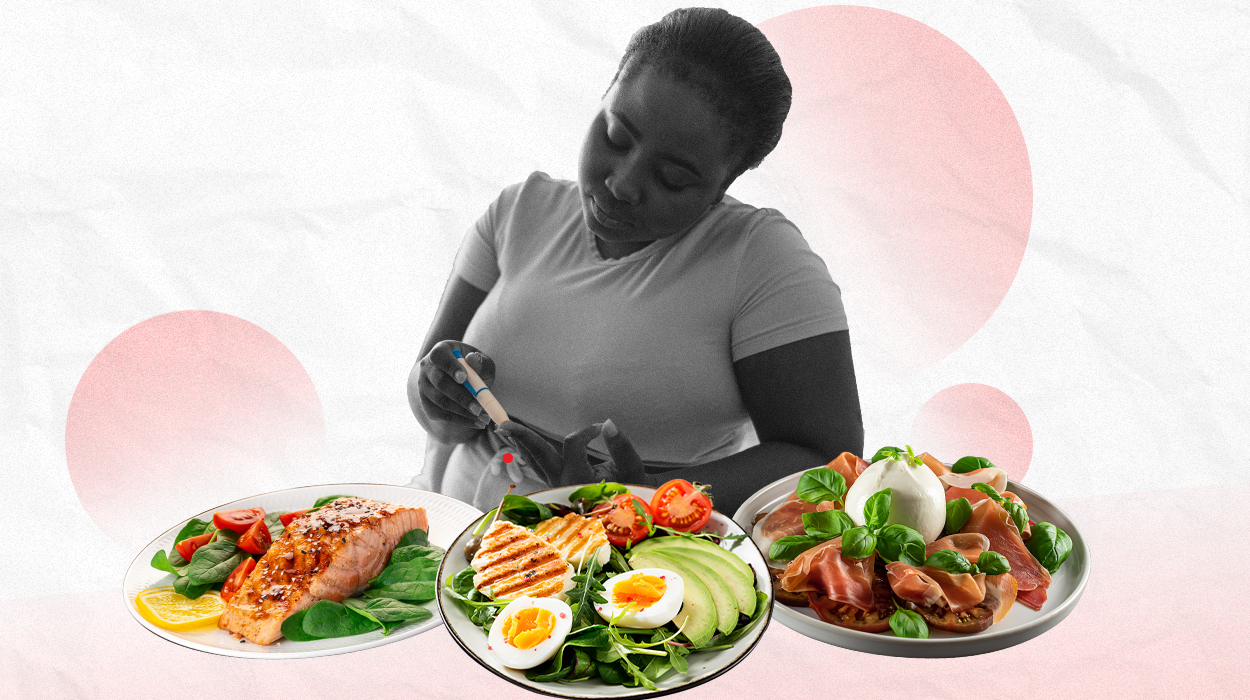 Expert's opinion
Expert's opinion
Expert's opinion
The article is a subjective view on this topic written by writers specializing in medical writing.
It may reflect on a personal journey surrounding struggles with an illness or medical condition, involve product comparisons, diet considerations, or other health-related opinions.
Although the view is entirely that of the writer, it is based on academic experiences and scientific research they have conducted; it is fact-checked by a team of degreed medical experts, and validated by sources attached to the article.
The numbers in parenthesis (1,2,3) will take you to clickable links to related scientific papers.
Is Keto Good For Diabetes? Side Effects & Suggestions 2024

Have you heard a lot about the ketogenic diet lately? You’re probably aware of its weight loss and health benefits. But did you know this diet may not be safe or healthy for everyone?
One of the populations that the keto diet may not be safe for is people with diabetes. While the ketogenic diet can lead to weight loss and improved blood sugar in the short term, it is generally not recommended for people with diabetes and can even be detrimental.
We will discuss both type 1 and type 2 diabetes in this article and will note the crucial differences between the two of them.
So, why is the keto diet bad for diabeteté? This article will discuss five reasons– all backed up by current research. If you or someone you know has diabetes, you won’t want to skip this one.
Is Keto Diet Good For Diabetes?
The answer is No. There are 5 reasons why this diet is not the best choice for people with diabetes:
- The keto diet is difficult to maintain
- Lack of research on long-term effects
- Fat intake & cardiovascular risk factors
- Lack of nutrients
- Increased risk of ketoacidosis and hypoglycemia
Why Is Keto Diet Bad For Diabetes? 5 Reasons Why

The Keto Diet Is Difficult To Maintain
Research suggests[1] that the ketogenic diet is challenging to maintain for many, and the initial benefits that accompany it, such as weight loss and improved insulin sensitivity, are often short-lived. Did you know the dropout rate for sticking with a low-carbohydrate ketogenic diet can be as high as 84%[2]? Many of those who start the keto diet cannot continue long-term. The more restrictive low-carb diets are, the harder they are to follow. At the end of this article, we will discuss another balanced diet plan and specific foods that can help improve glycemic control with less effort.
Lack Of Research On Long-Term Effects
There is little data and research on the keto diet involving studies greater than twelve months, and the potential long-term effects of this diet are not yet known. We hope to see more studies regarding the long-term safety of this diet plan in the future. In the meantime, this limitation regarding long-term effects should be noted, especially in a lifelong, chronic condition such as diabetes.
Fat Intake & Cardiovascular Risk Factors
People with diabetes, especially type 2 diabetes, are already at a higher risk than others for cardiovascular diseases such as heart failure, heart attack, and stroke. These two combined risk factors must be considered when deciding on a diet. Since ketogenic diets are high-fat diets, dieters need to be aware of the difference between unhealthy saturated fats and healthy unsaturated fats. The American Heart Association recommends that no more than 13 grams or 6% of your daily calories are from unhealthy, saturated fat. A diet high in saturated fat will increase your LDL cholesterol and triglycerides, leading to weight gain and an increased risk for atherosclerosis, heart attack, and stroke.
Lack Of Nutrients
The ketogenic diet is a very low carbohydrate diet, and some carbohydrates are good sources of nutrients that are beneficial in stabilizing blood sugar and insulin levels. Two of those nutrients that help with glycemic control are fiber and magnesium.
Fiber – Soluble fiber[3] prevents blood sugar spikes and keeps your blood sugar at a healthy level. Common sources of soluble fiber are whole grains, potatoes, and fruits, and these foods are highly restricted in the ketogenic diet.
Magnesium- Research suggests that chronically low magnesium[4] leads to increased insulin resistance– which means that insulin will be less effective. Getting adequate magnesium can be a challenge on the keto diet,[5] as many dietary sources of magnesium are whole grains, legumes, rice, oats, and bananas– all of which are restricted in the ketogenic diet.
Increased Risk Of Ketoacidosis And Hypoglycemia
This section primarily applies to individuals with type 1 diabetes. In type 1 diabetes, research cautions[6] of a higher risk of both diabetic ketoacidosis and hypoglycemia (low blood sugar) in very low carbohydrate diets. While rarer in type 2 diabetes, it is important to be aware of the signs of these conditions. First, it is essential to note the difference between ketosis and ketoacidosis.
Ketosis
Ketosis is when your body starts burning fat for energy instead of carbohydrates. Ketones are the byproduct of fat breakdown, and having enough ketones in your blood creates a state called ketosis. Being in ketosis is the goal of the ketogenic diet- it means that fat is being burned and weight is being lost.
Diabetic Ketoacidosis[7] or DKA, is a complication where enough ketones build up in your blood to make your blood acidic and create metabolic changes that can ultimately lead to a coma or death if left untreated. Ketoacidosis is a life-threatening complication and generally occurs because of an extreme lack of insulin in people with type 1 diabetes. Ketoacidosis occurs more commonly in type 1 diabetes because they are insulin deficient– and rely entirely on insulin injections for carbohydrate metabolism. Type 2 diabetes are insulin-resistant versus deficient and are generally at a lower risk for ketoacidosis.
Hypoglycemia
People with diabetes can be at risk for hypoglycemia or low blood sugar on a ketogenic diet because carbohydrates are the body’s preferred fuel source Dietary carbohydrates are broken down into sugar and absorbed into the bloodstream as blood glucose. Carbohydrates are severely restricted on a ketogenic diet, leading to overall blood sugar control. This risk can be increased in a person with type 1 diabetes due to insulin administration. If a person with type 1 diabetes chooses to start a ketogenic diet, their insulin regimen should be adjusted[6] to account for a lower intake of carbohydrates. If insulin is given when carbohydrates are not eaten, low blood sugar can result.
The Keto And Diabetes Defined
What Is Diabetes?
Diabetes is a chronic, long-term condition. It involves the pancreas, which is an organ that produces insulin. Insulin is a hormone that regulates the amount of glucose or sugar in the bloodstream. There are two types of diabetes:
Type 1 Diabetes[8] In patients with type 1 diabetes, the pancreas makes no insulin or produces very little insulin. Without insulin, glucose cannot be used as energy by the body’s cells and instead remains in the bloodstream, leading to high blood glucose. People with type 1 diabetes rely on regular insulin injections to manage blood sugar levels. It is typically diagnosed during childhood or adolescence but can develop in adulthood.
Type 2 Diabetes[9] In patients with type 2 diabetes, the body’s cells stop responding normally to insulin, which is called insulin resistance and leads to high blood glucose levels. Type 2 diabetes is typically acquired in adulthood but can sometimes develop in children. It can often be managed with weight loss, dietary changes, and exercise, but sometimes insulin injections or other medication is necessary.
If either type of diabetes is not managed well, continued high blood sugar over time can lead to problems with the nervous, circulatory, and immune systems.
What Is The Keto Diet?
The ketogenic, or keto diet is a high fat, low to medium protein, low carbohydrate diet. When minimal carbohydrates are eaten, your body cannot use carbs for energy. Instead, your body begins to burn fat for energy– called ketosis.
This low-carbohydrate and high-fat diet requires strict adherence to eating a minimal amount of carbohydrates per day and to eating the correct ratio of carbs versus fat and protein. When the diet recommendations are not closely followed, ketosis is not achieved, and weight loss benefits are not seen.
Symptoms For Diabetes On Keto

Let’s take a closer look at the two critical complications that may occur in people with diabetes while on the keto diet. These are hypoglycemia, or low blood sugar, and diabetic ketoacidosis– where enough ketones build up in your blood to make it acidic.
Symptoms of ketoacidosis
- Extreme thirst
- Urinating frequently
- Nausea and vomiting
- Fatigue and tiredness
- Shortness of breath
- Fruity breath
- Confusion
- High blood sugar & high ketones in the urine
If you believe you are in ketoacidosis, contact your healthcare provider or seek emergency care. Untreated ketoacidosis can lead to unresponsiveness and death.
Symptoms of hypoglycemia
- Sweaty
- Shaky
- Pale
- Headache
- Hunger, nausea, or vomiting
- Fatigue, irritability, or anxiety
- Lightheadedness or confusion
- Blurred vision
As hypoglycemia gets worse, one can become unresponsive or have a seizure. Hypoglycemia can lead to death if untreated. Hypoglycemia is treated with carbohydrates, sugar, or glucose.
When To See A Doctor
If you are considering any new diet and have either type 1 or type 2 diabetes, see your doctor for guidance. Any new diet regimen might require that your insulin injections or other diabetes medication, such as metformin, be adjusted.
Also, as noted above, if you have diabetes and cannot correct your hypoglycemia, or believe you are experiencing symptoms of diabetic ketoacidosis, contact your doctor or seek emergency care.
Other Diet Options For Diabetes
The Mediterranean diet[10] is a less restrictive option than the keto diet, allows for greater carbohydrate intake, and can benefit people with diabetes. The traditional food choices of some Mediterranean countries can lead to weight loss and lower the risk of cardiovascular disease and other chronic conditions such as diabetes. This diet focuses on the intake of healthy, unsaturated fats. It also encourages eating whole grains, vegetables, fruits, legumes, beans, and extra virgin olive oil. Animal proteins are okay, with fish such as salmon being a great choice. Here are some other snacks that are great for people with diabetes, in addition to the food choices listed above.
Conclusion
While the ketogenic diet can help you lose weight and improvements in insulin sensitivity in the short term, it is not widely recommended in people with diabetes for several reasons. The long-term effects of a ketogenic diet in diabetic individuals are not yet known. The ketogenic diet is also difficult to sustain because it is so restrictive, and it can lead to excess triglycerides and a deficit of necessary nutrients if not done with great care and consideration. It can also increase the risk of diabetic complications, such as hypoglycemia and diabetic ketoacidosis.
Research suggests that the risks of a ketogenic diet may outweigh the benefits for people with diabetes. We hope you found this article informative– It is essential to find a diet plan that works for you, your lifestyle, and your diabetes.
+ 10 sources
Health Canal avoids using tertiary references. We have strict sourcing guidelines and rely on peer-reviewed studies, academic researches from medical associations and institutions. To ensure the accuracy of articles in Health Canal, you can read more about the editorial process here
- Crosby, L., Davis, B., Joshi, S., Jardine, M., Paul, J.L., Neola, M. and Barnard, N.D. (2021). Ketogenic Diets and Chronic Disease: Weighing the Benefits Against the Risks. Frontiers in Nutrition, [online] 8. doi:https://doi.org/10.3389/fnut.2021.702802.
- Ting, R., Dugré, N., Allan, G.M. and Lindblad, A.J. (2018). Ketogenic diet for weight loss. Canadian family physician Medecin de famille canadien, [online] 64(12), p.906. Available at: https://www.ncbi.nlm.nih.gov/pmc/articles/PMC6371871/ [Accessed 16 Oct. 2023].
- CDC (2022). Fiber: The Carb That Helps You Manage Diabetes . [online] Centers for Disease Control and Prevention. Available at: https://www.cdc.gov/diabetes/library/features/role-of-fiber.html [Accessed 16 Oct. 2023].
- Barbagallo, M. and Domínguez, L.J. (2015). Magnesium and type 2 diabetes. World Journal of Diabetes, [online] 6(10), pp.1152–1152. doi:https://doi.org/10.4239/wjd.v6.i10.1152.
- Crosby, L., Davis, B., Joshi, S., Jardine, M., Paul, J.L., Neola, M. and Barnard, N.D. (2021). Ketogenic Diets and Chronic Disease: Weighing the Benefits Against the Risks. Frontiers in Nutrition, [online] 8. doi:https://doi.org/10.3389/fnut.2021.702802.
- Buehler, L., Noe, D., Knapp, S.M., Isaacs, D. and Pantalone, K.M. (2021). Ketogenic diets in the management of type 1 diabetes: Safe or safety concern? Cleveland Clinic Journal of Medicine, [online] 88(10), pp.547–555. doi:https://doi.org/10.3949/ccjm.88a.20121.
- CDC (2021). Diabetic Ketoacidosis . [online] Centers for Disease Control and Prevention. Available at: https://www.cdc.gov/diabetes/basics/diabetic-ketoacidosis.html
- CDC (2023). What Is Type 1 Diabetes? [online] Centers for Disease Control and Prevention. Available at: https://www.cdc.gov/diabetes/basics/what-is-type-1-diabetes.html
- CDC (2023). Type 2 Diabetes. [online] Centers for Disease Control and Prevention. Available at: https://www.cdc.gov/diabetes/basics/type2.html
- Davis, C.R., Bryan, J., Hodgson, J.M. and Murphy, K. (2015). Definition of the Mediterranean Diet; A Literature Review. Nutrients, [online] 7(11), pp.9139–9153. doi:https://doi.org/10.3390/nu7115459.



